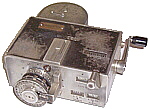|
Monday the second of October
1967, a date inscribed forever in the elaborate
hand of the depot superintendent on the
inside of the front cover of my Hants and
Dorset rule book along with the number 743
which was also on my clock card. The rule
book, now battered from spending years at
the bottom of my ticket box, covers every
aspect of a driver or conductor's working
day. I was also given a timetable and a
set of fare charts plus five shillings float
(so that I could give change to the first
passengers before I had collected enough
fares), to be paid back when I left.
|
 |
|
A brief tour of the depot
and offices was followed by a long wait
in the canteen while it was decided what
should be done with me. The canteen was
run by the staff social club and had a snooker
table. There was a small group in one corner
playing cards, several people eating, drinking
tea or smoking. The ones in a hurry did
all of these at the same time.
|
 |
|
It seemed a completely
alien world, the more so because I had no
idea what any of them were talking about.
Eventually, an inspector showed me how to
use a ticket machine and how to complete
the conductor's official document, the waybill.
On this I had to record the start and finish
numbers on the ticket machine for each journey
and calculate the money taken.
|
 |
| The
ticket machine was the Setright. This was
loaded with a blank ticket roll and had dials
on the top for the date, the fare stage and
one each for shillings and pence (later ten
pences and pence). There was a lever to select
single, return and other ticket types. |
 |
  |
 |
| There
were counters to record the value of tickets
issued (one in halfpennies the other in shillings),
one for the total tickets issued, others for
child and return tickets, and one which could
be set by the office to any value or ticket
type for analysis. |
 |
| A
slot in the front was used to overprint returns
and took individual tickets such as weeklies
and transfers as well as 'day out' tickets
which gave unlimited travel. There was a hole
punch on the top of the machine to cancel
these on each journey. |
 |
| The
loose tickets were carried on a wooden rack.
These were five-day weeklies, six-day weeklies,
day-out tickets, transfers to Aldershot &
District service 14 and transfers to Southdown
services to Portsmouth. These loose tickets
had to be issued in numerical order and were
difficult to handle when your hands were very
cold. |
 |
| I
would not have my own ticket machine until
I had completed my two weeks training but
I was issued with the sling on which it was
to be worn and a cash bag. An old, worn cash
bag was best. The stiff leather of a brand
new one would leave your fingers sore and
a new strap for the machine would cut into
your shoulder. |
 |